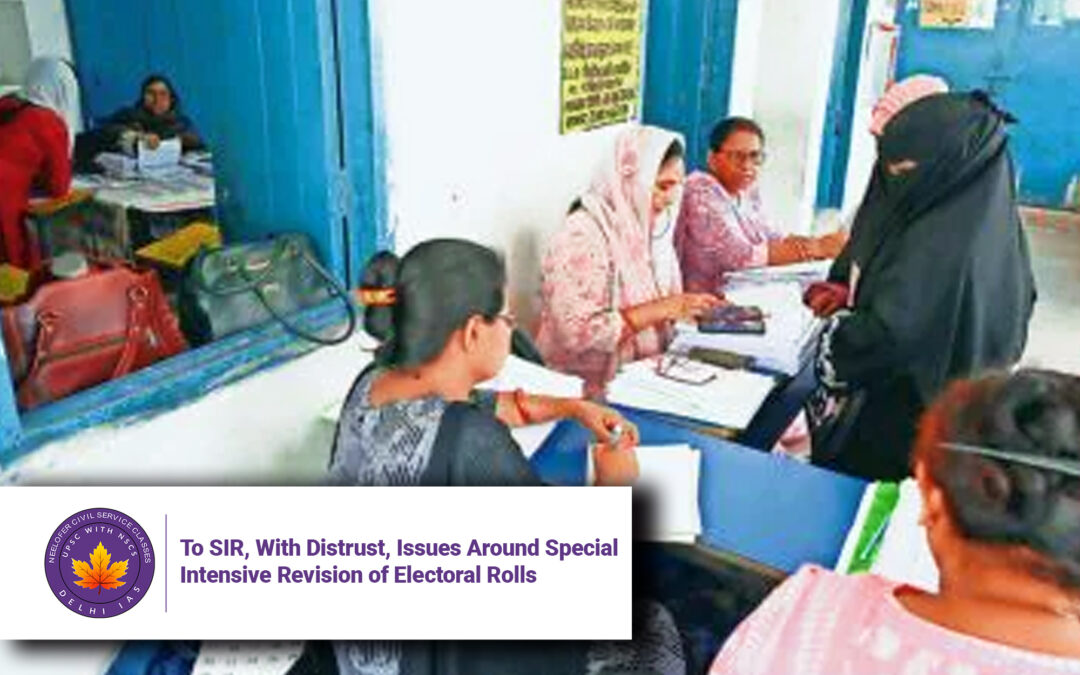To SIR, With Distrust, Issues Around Special Intensive Revision of Electoral Rolls
Why in News
The Election Commission of India (ECI) recently initiated the Special Intensive Revision (SIR) of electoral rolls across different states. While such revisions are meant to strengthen the credibility of elections by ensuring that only eligible voters are included, the process has instead sparked controversy and distrust. In Bihar, the SIR exercise has raised concerns of large-scale disenfranchisement, while in Karnataka, discrepancies in Bengaluru Central’s voter rolls have further heightened skepticism. Protests in Kolkata and elsewhere highlight the growing unease among citizens who fear that lakhs may be unfairly denied their constitutional right to vote.
Introduction
Free and fair elections are the foundation of democracy. In India, where the electorate numbers in the hundreds of millions, electoral rolls form the backbone of the democratic process. Every eligible citizen above the age of 18 has the right to vote, provided their name is correctly entered in the rolls. Periodic revisions—both ordinary and special—are undertaken to remove deceased voters, include new eligible voters, and update residential information.
However, the Special Intensive Revision (SIR) has come under sharp criticism. Instead of bolstering transparency, it has raised concerns about errors, lack of clarity, and possible deliberate disenfranchisement. Critics argue that far from being a neutral bureaucratic exercise, the SIR seems to disproportionately exclude legitimate voters, particularly in Bihar, and creates suspicion when unexplained anomalies are found in Karnataka.
This distrust raises a fundamental question: Can India’s electoral process remain credible if voter roll revisions themselves are seen as questionable?
Key Issues and Background
1. Natural Events and Electoral Rolls
It is undeniable that deaths must be recorded and corresponding names removed from the electoral rolls. But equally, all young citizens who cross the age of 18 must be included. In 2018, over 4 crore new voters were added nationwide. This natural expansion of the rolls continues every year. Yet, the SIR in Bihar created confusion by permanently relocating or removing large numbers of voters without transparency.
2. Disenfranchisement in Bihar
In Bihar, the stated motive of SIR was cleansing the rolls, but the effect has been fear and distrust. Many people believe thousands of legitimate voters will be denied their right to vote in the upcoming elections. The opaque process, unexplained removals, and bureaucratic terms like “permanently relocated” have deepened suspicion.
The article highlights that crores of citizens could face disenfranchisement if SIR is extended nationwide in its current form. Instead of making elections more credible, it risks excluding the very people it was supposed to empower.
3. The Karnataka Challenge
Karnataka’s Bengaluru Central constituency, consisting of eight Assembly Constituencies (ACs), presented another case. In the 2024 Lok Sabha elections, Congress led in six of the eight ACs, while the BJP won in Mahadevapura. Here, Congress’ lead was over 82,178 votes, but BJP’s victory margin in Mahadevapura (1,14,046 votes) overturned this advantage.
Adding postal ballots, the BJP extended its margin by 31,868 votes. Eventually, the BJP candidate was declared the winner with a lead of 32,707 votes.
While the margin is decisive, the issue lies in errors in the voter rolls—examples include:
-
Voter cards with fathers’ names written in gibberish.
-
Voter cards showing absurd ages like “0” or “124.”
-
Unusual numbers of voters registered in the same dwelling.
These prima facie anomalies raise doubts about whether the electoral rolls are being maintained honestly or manipulated.
4. The Problem of Credibility
At the heart of the debate is the credibility of electoral rolls. The ECI insists that it is independent and impartial, but repeated errors and unexplained exclusions weaken public trust. If voters themselves doubt whether their names will be on the rolls, the very legitimacy of elections suffers.
Specific Impacts or Effects
-
Fear of Mass Disenfranchisement
The biggest impact is psychological—millions of citizens now fear they may be unfairly denied voting rights. This erodes trust not only in electoral rolls but also in the ECI as an institution. -
Loss of Democratic Participation
If eligible citizens are removed from rolls without clarity, they lose their fundamental right to vote. In a democracy, even small-scale disenfranchisement can alter results in closely contested constituencies. -
Rise of Protests and Polarisation
In states like West Bengal, Bihar, and Karnataka, protests have erupted over the SIR exercise. Political parties are increasingly framing the issue as one of deliberate exclusion, which could polarise voters further. -
Judicial Scrutiny Likely
Given the errors (like ages marked “0” or “124”), courts may be called upon to intervene. This can delay electoral processes and undermine efficiency. -
Credibility of ECI in Question
The ECI has historically been a respected institution, but repeated controversies over electoral rolls risk tarnishing its reputation. If the ECI is perceived as partisan, the foundation of Indian democracy will be shaken.
Challenges and the Way Forward
Challenges:
-
Transparency Deficit – The SIR process lacks clear communication about why voters are being removed or relocated.
-
Technological Errors – Digitisation has introduced clerical mistakes like gibberish names or incorrect ages.
-
Trust Deficit – Citizens increasingly distrust the ECI, believing revisions are politically motivated.
-
Scale of Exercise – With over 900 million voters, even a small error rate affects millions.
-
Legal Ambiguities – Terms like “ordinarily resident” and “permanently relocated” remain unclear.
Way Forward:
-
Independent Audits – Electoral rolls must be periodically reviewed by independent agencies, not just the ECI.
-
Public Verification Drives – Citizens should be given easy mechanisms (online and offline) to verify and correct their entries.
-
Technological Safeguards – Advanced tools like AI-based anomaly detection can flag absurd entries (e.g., ages “0” or “124”).
-
Clear Legal Framework – Definitions of “resident” and “relocated” must be clarified to prevent misuse.
-
Restoring Trust in ECI – The ECI must proactively engage with civil society and political stakeholders to rebuild credibility.
Conclusion
The ongoing controversy over the Special Intensive Revision (SIR) underscores a paradox in India’s democracy: an exercise meant to strengthen credibility is instead undermining it. From Bihar’s fears of mass disenfranchisement to Karnataka’s suspicious errors, the issue highlights a deeper problem—citizens no longer trust that electoral rolls are neutral and accurate.
The credibility of elections does not lie only in the act of voting but in the belief that every eligible citizen’s right is respected. If electoral rolls themselves become instruments of exclusion or suspicion, India risks damaging the very legitimacy of its democratic process. The ECI must act urgently to ensure that inclusivity, transparency, and trust are restored before the next electoral cycle.
5 Questions and Answers
Q1. What is the Special Intensive Revision (SIR) of electoral rolls?
SIR is a process conducted by the Election Commission of India to update voter lists by removing deceased or ineligible voters and adding new eligible citizens. It aims to maintain accuracy but has sparked controversy due to alleged errors and exclusions.
Q2. Why is SIR controversial in Bihar?
In Bihar, the SIR exercise has raised fears of large-scale disenfranchisement. Many believe that lakhs of eligible voters may be unfairly excluded due to unclear definitions like “permanently relocated” and lack of transparency.
Q3. What anomalies were found in Karnataka’s Bengaluru Central constituency?
Errors included voter cards with nonsensical names, ages listed as “0” or “124,” and unusually high numbers of voters registered at the same address. These raise doubts about the credibility of voter rolls.
Q4. How can electoral roll credibility be improved?
Measures include independent audits, citizen-friendly verification mechanisms, use of AI-based tools to detect anomalies, and clearer legal definitions of voter residency.
Q5. Why is electoral roll credibility so important in a democracy?
Electoral rolls are the foundation of voting rights. If citizens doubt whether they are fairly included, the very legitimacy of elections is compromised. Trust in the Election Commission and democracy itself depends on accurate, transparent voter rolls.







